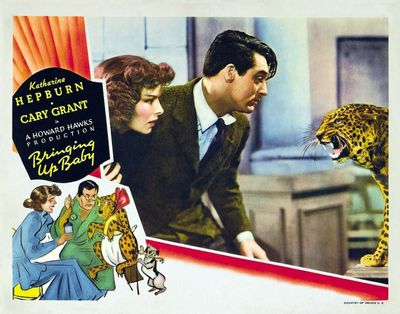Don’t drop the Baby: 85 years since ‘Bringing Up Baby’ changed the course of cinematic comedy

It’s hard to believe, but the classic film “Bringing Up Baby,” released 85-years ago, was a box office bust.
However, “Bringing Up Baby” was embraced during the ‘50s when it was shown on television. A number of beloved movies also were stiffed, but became beloved and hit paydirt years after release, such as “The Wizard of Oz,” “Heathers,” “Willy Wonka and the Chocolate Factory,” “Blade Runner” and “The Shawshank Redemption.”
Somehow “Bringing Up Baby,” a brilliant screwball comedy, which landed on the American Film Institute’s Top 100 movies of all-time list, failed to connect with the general public pre-World War II. Critics claimed that Katherine Hepburn, who co-starred with Cary Grant, was box office poison. That changed with 1940’s “The Philadelphia Story,” which hit screens two years later and also co-starred Grant (along with James Stewart).
The word from the “Bringing Up Baby” set was that it was as much fun as the film, which is about a nerdy paleontologist co-existing with a flighty heiress and her leopard named Baby.
Production was often delayed due to uncontrollable laughing fits between Hepburn and Grant. It’s not surprising since the chemistry between the iconic actors is palpable. Hepburn and Grant’s connection is magical, including in 1935’s “Sylvia Scarlett,” and 1938’s “Holiday.”
“Sylvia Scarlett” isn’t a brilliant film, but it’s worth catching Hepburn portray a boy to escape the police and move about in a free manner in society. The movie was made 15 years after women were finally allowed to vote. Grant plays an affable smuggler.
“Holiday” is unadulterated fun. Hepburn portrays an unhappy wealthy woman who falls in love with her sister’s new, forward-thinking fiancée, played by Grant. Their talent for physical comedy during “Holiday” is a nice surprise. “The Philadelphia Story” is a treasure. There is nothing like Hepburn and Grant acting like they despise each other. The dialogue is amusing and biting.
“Bringing Up Baby” is an all-time great feel-good film. Director Howard Hawks’ masterpiece is delightful as the audience falls in love with two characters who get on each other’s nerves in the most amusing way possible. When Baby gets loose the fun begins. No wonder “Bringing Up Baby” has become cinematic comfort food.
“It isn’t that I don’t like you, Susan, because after all, in moments of quiet, I’m strangely drawn toward you, but well, there haven’t been any quiet moments,” Grant deadpans in one of the film’s oft-quoted lines. Drum roll, please. That was one of the many great lines delivered by Grant, which reflects all of the witty dialogue of the time that propels one of the fastest-paced comedies of all time.
Not only does “Bringing Up Baby” still hold up, it laid down the template for much of modern cinematic comedy. The main characters behave like children. The supporting cast is wacky. An animal plays a prominent part. Grant’s relationship with Baby is reminiscent of Ben Stiller’s back and forth with the dog in the hilarious “Something About Mary.” Both characters have to hide their anger in order to get what they want.
An airhead makes the life of a level-headed character difficult has been the plot of many films, which recalls John Hughes’ “Planes, Trains and Automobiles,” among other movies.
However, the difference between “Bringing Up Baby” and many films, which appropriated elements of the movie, such as “Step Brothers,” “Dinner for Schmucks” and “Dumb and Dumber,” is that there is not a mean bone in the film or the skeleton of the brontosaurus that Grant’s character is constructing.
And they certainly don’t make them like Grant and Hepburn anymore since both actors spoke in a very distinct manner. Most actors today echo those in the world of broadcast news.
Linda Ellerbee summed it up in her illuminating book, “And So It Goes,” by noting that television news anchors sound like they were raised in the same room.
The same goes for contemporary actors. Can anyone distinguish Tom Hanks’ accent and speech pattern from Tom Cruise? And then there were the likes of Stewart, who had a voice that was as distinct as a fingerprint.
Some of “Bringing Up Baby” is dated, but that’s to be expected of a movie made just a few years after the Great Depression arrived. However, the intelligent writing, the joyful silliness and the rapid-fire dialogue between Hepburn and Grant make it a sheer delight and a terrific film for the entire family.